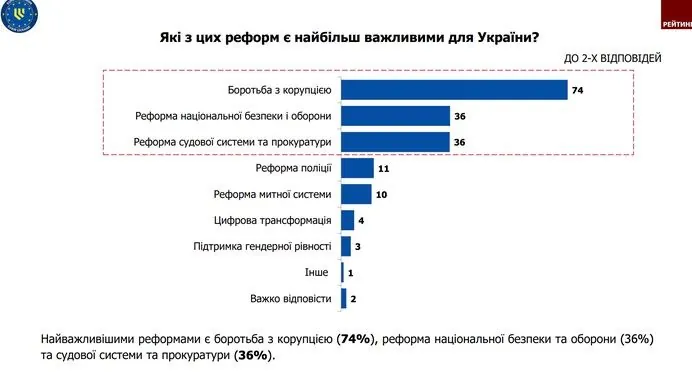Ukrainians want changes in the anti-corruption system more than in customs - poll
Kyiv • UNN
According to a poll by Rating, 74% of Ukrainians named the fight against corruption as the most important reform, while only 10% considered customs a priority. 84% of respondents are dissatisfied with the current results of anti-corruption reform.

Anti-corruption reform remains a top priority for Ukrainians, with 74% of respondents calling the fight against corruption the most important reform of all. By comparison, only 10% of respondents consider changes in customs to be a top priority. This is according to a survey conducted by the sociological group "Rating".
Details
According to the survey results, only 15% said they were satisfied with the fight against corruption, while the majority of respondents (84%) were dissatisfied with the current results of anti-corruption reform.
For comparison, 56% of respondents are dissatisfied with the customs system reform, and almost 30% are satisfied with the changes at customs.
Although citizens do not see customs reform as a top priority, it was decided to completely restart this body and the Verkhovna Rada recently adopted a law.

It is not yet clear whether anti-corruption reform will be implemented in Ukraine, but it is possible that the results of the recently launched external independent audit of the National Anti-Corruption Bureau of Ukraine will be the impetus for its implementation.
Recall
The Anti-Corruption Bureau was established in 2014 as part of the system of anti-corruption bodies to fight corruption among high-ranking officials, in the context of fulfilling Ukraine's commitments to the EU and the International Monetary Fund. However, corruption in Ukraine remains one of the main problems.
Recently, there have been frequent statements about the loss of independence of anti-corruption bodies in Ukraine. In particular, this was stated by the recently dismissed first deputy director of the bureau, Gizo Uglava. He has repeatedly hinted that decisions at the NABU are made under the influence of external factors rather than on the basis of the law. Among the individuals and institutions that he believes exerted this pressure were activists of the Anti-Corruption Action Center (AntAC) and the head of the Verkhovna Rada Committee on Anti-Corruption Policy, who, as Uglava noted, used to work at the AntAC.
The same opinion is supported by lawyers, who also stated that the real goal of anti-corruption activists has turned from fighting corruption to putting pressure on certain public officials to achieve "external" goals.
In addition, the NABU's Public Control Council (PCC) recently stated that detectives are not effective in investigating corruption in the defense sector. According to Kateryna Datsenko, a military wife and representative of the PIC in the personnel commission, a significant increase in the number of corruption cases in the defense sector was expected with the start of a full-scale war. However, as of today, only 48 criminal proceedings are underway, and only 7 people have been notified of suspicion.
The public has repeatedly drawn attention to the fact that the NABU wastes public resources and time on cases that are not critical and have questionable judicial prospects. A good example is case against former Minister of Infrastructure Volodymyr Omelyan. Almost three years were spent investigating this case, in which the HACC eventually delivered an acquittal. By the way, neither NABU detectives nor SAPO prosecutors have ever publicly apologized to Omelian or been punished for illegally bringing him to criminal responsibility.
A similar story may happen now with former Minister Mykola Solsky, who was publicly accused by NABU and SAPO in May of misappropriating land. The point is not that Solsky himself took possession of the land, but that he helped ATO fighters to register land plots that, according to detectives, should have gone to other people, in particular, to be put up for auctions by the State Property Fund for the sale of land. This story is already eight years old, and the reasonable investigation timeframe has long since expired, but detectives decided to announce suspicions this year. In the near future, they plan to interrogate almost 1,500 ATO soldiers. In addition, the NABU tried to leak the expert examination in the case against Solsky, which they themselves ordered and which, obviously, was supposed to testify to his innocence.